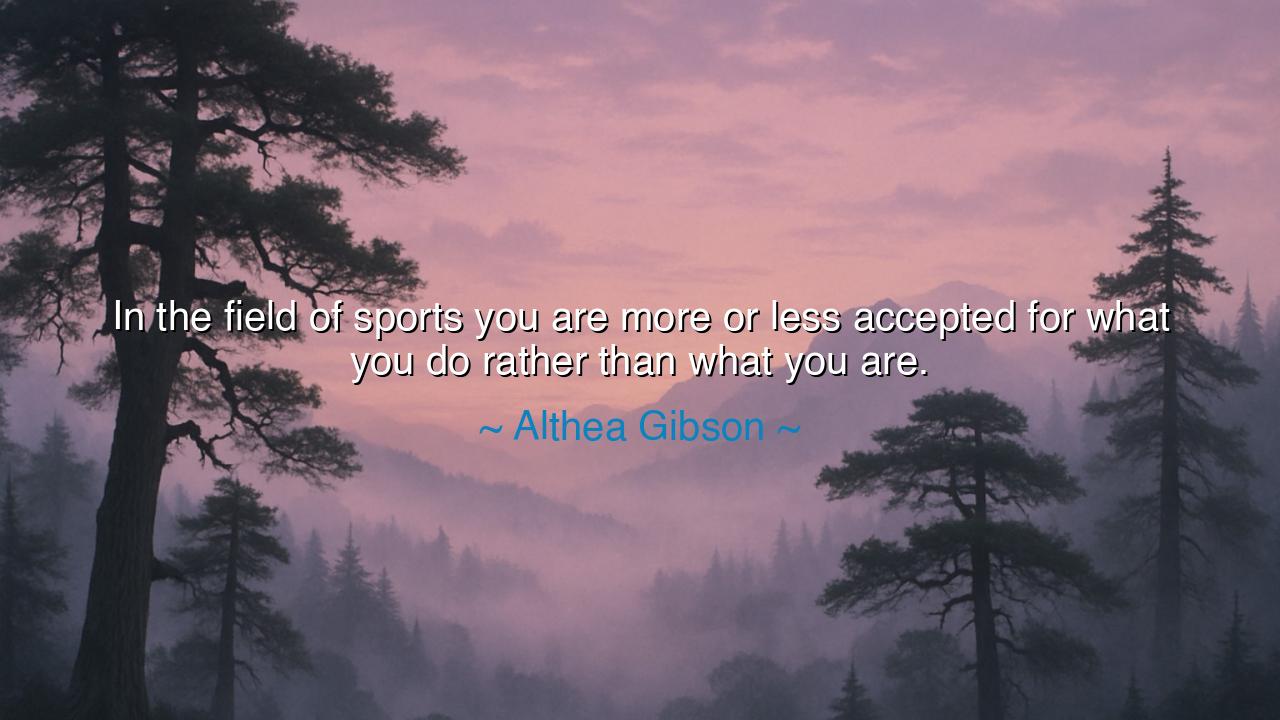
In the field of sports you are more or less accepted for what
In the field of sports you are more or less accepted for what you do rather than what you are.






The words of Althea Gibson—“In the field of sports you are more or less accepted for what you do rather than what you are”—are both a revelation and a warning. They remind us that in the sacred arena of competition, the measure of a person is often found not in their birth, their appearance, their station, or their name, but in their deeds, in their courage, and in the excellence of their performance. On the field, the court, or the track, the body moves, the spirit strives, and the truth of one’s effort shines brighter than any prejudice. Yet, hidden within her words is also the pain of one who knew that beyond the boundaries of the game, society was slower to embrace such justice.
Gibson spoke from the crucible of her own experience. Born into poverty in South Carolina, and rising as the first Black athlete to break the color barrier in international tennis, she knew that outside the court she was judged by her skin, her gender, her place in the world. But in sports, she discovered a rare clarity: a forehand either strikes or it misses, a serve either lands or it fails. In those moments, bias falls silent, and achievement speaks with a voice that cannot be denied. The field of play is not perfect, but it is closer to fairness than most of the world.
The ancients also understood this. In the Olympic Games of Greece, free men from different cities and regions contended together. Though their nations warred and their customs clashed, on the field their worth was judged not by lineage or wealth, but by their speed, their strength, their skill. A man of low birth could humble a nobleman if his body carried him swifter to the finish line. In this way, the arena of competition served as a great equalizer, a place where what you did outweighed what others thought you were.
Consider also the story of Jackie Robinson, who entered Major League Baseball when the color line still divided the nation. Off the field, he endured insults, threats, and hatred. But on the diamond, when he stole bases with lightning speed, when he hit with precision, when he played with undeniable brilliance, the truth was plain: he was a ballplayer worthy of honor. His deeds spoke louder than prejudice, and though the world outside was slow to change, the field bore witness to his excellence and demanded respect.
The emotional weight of Gibson’s words lies in their dual edge: in the field of sport, a person may earn acceptance through skill and courage; yet beyond it, society still clings to shallow judgments of “what you are.” She points us to a paradox—sports can inspire unity and respect, but they also reveal the injustice that such fairness is not yet universal in all walks of life. It is as if the field shows us what humanity could be, if only it learned to value effort and character above division and prejudice.
For the seeker of wisdom, the lesson is clear: live in such a way that your deeds speak louder than appearances. Strive for excellence in whatever field is yours—whether sport, craft, or work—and let your actions be your true voice. But also recognize the higher calling: to take the fairness of the sporting field and extend it into all of life, so that judgment by deeds, not by surface, becomes the measure of humanity everywhere.
What then must we do? We must honor those whose deeds break barriers, as Gibson did with her racket, as Robinson did with his bat, as countless others have done with their gifts. We must strive for excellence not only to uplift ourselves, but to carve open doors for those who come after us. And we must challenge the world beyond the arena, demanding that the justice found in sport extend into classrooms, workplaces, and communities. For only then will Gibson’s wisdom reach its full truth.
Thus, her words echo through time: in sports you are judged by what you do—let that spirit guide us in all of life. Let us measure one another not by the accidents of birth, but by the strength of effort, the honesty of action, and the courage of heart. In this, we will not only honor the spirit of the game, but fulfill the highest calling of humanity itself.






AAdministratorAdministrator
Welcome, honored guests. Please leave a comment, we will respond soon